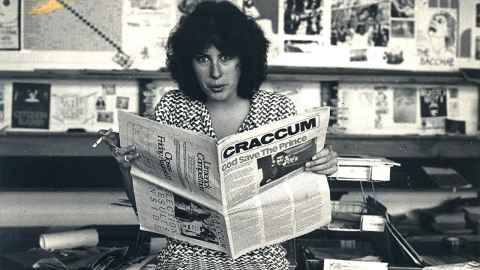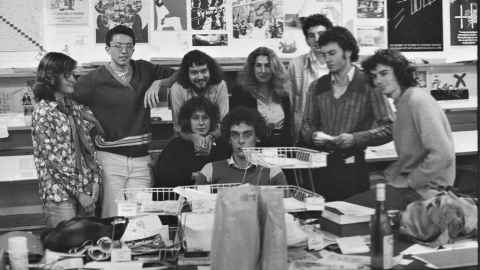1970s Craccum editor Louise Chunn: what generation gap?
16 May 2022
Opinion: Louise Chunn writes that if older people stopped to remember their own youthful enthusiasms and listened to young people's perspectives, they may learn a little.

I’m dressed in my op-shop finery with a henna-ed curly perm, 20 fags a day habit and have a frantic drive to see/hear/do everything before it was too late.
Writing a piece for the University of Auckland alumni magazine feels like my wheel has gone full circle.
I started as a journalist while doing my BA in history in the 1970s and proudly became editor of Craccum in 1978. In those days, I’m dressed in my op-shop finery with a henna-ed curly perm, 20 fags a day habit and have a frantic drive to see/hear/do everything before it was too late.
The Who’s immortal line “Hope I die before I get old” seemed to ring loud in the ears of my mates and me, but there’s always been a need for the young to climb over, or even overthrow, what went before. Just as I no longer smoke or read Herman Hesse, I have changed, grown up, matured; I am not that girl with those desperate desires.
But we can all remember those feelings, and I am here writing this piece to say that I think we should call them to mind more often. In that way you can see more clearly the wide gulf between you and those who are currently sitting in those lecture halls, or turning up where you work to disrupt and demand. They can be phenomenally irritating, but wasn’t I, with my black and white opinions. And you too?
Having spent the decades post-university working as a journalist in London, I have seen up-close how things have changed in my industry. When I started, we worshipped at the altar of the coolest kids, or the best writers, or the most charismatic photographers. I worked on such magazines as Elle, Vogue, In Style, as well as The Guardian and Evening Standard. The power of print, a symbol of old technology, faded before my eyes. By the time I exited from my last editor’s chair – at Psychologies, a monthly co-owned by a French company – many of the glamorous iconic titles I’d worked on had ceased printing, and some had closed altogether.

All workplaces have been changed by the combination of digital advertising and the internet. One of the outcomes of that is the crumbling of hierarchies and the downplaying of experience. So the awe in which I held the editors and writers I first met when I came to London is not felt by young journalists these days. The way to build your reputation is no longer by building up a body of work and channelling your idols, but by shooting multiple feel-good videos and pulling in the likes and follows on social media platforms.
The generation gap has escalated with all this change. Being over 50 can feel tantamount to finished when the next new thing out of Silicon Valley is all anyone wants to talk about. Veterans are shocked and often repelled by the upheaval and apparent reversal of their fortunes. As the relationship between young and old can seem unyielding, many feel swept aside and so avoid connecting with people much younger than them.
But it’s my belief that both ends of the pole can flourish from spending more time together. If all you hear of young people is demands that you change your attitudes and language to fit their view of the world, lest you be ‘on the wrong side of history’, then you might feel repelled by their righteousness. But if you stop to consider your own youthful enthusiasms, and give up some of your time to listen to what things look like from their perspective, you might learn a little, even begin to change your stance.
As the relationship between young and old can seem unyielding, many feel swept aside and so avoid connecting with people much younger than them.

I’d say the same to them: and I do. I don’t profess to know everything, but by dint of my experience of life, I do have some knowledge to pass along. How I do that will affect how it is perceived. Who wants a blowhard rambling on about their past triumphs? How much better to meet people half-way, alluding to your opinions rather than bellowing them, asking what those who are not your age (and also your gender, ethnicity, political inclination, whatever else divides you) believe, rather than trying to carpet-bomb them first.
Some might say that’s a return to the old-style civility I would have derided as phoney when I was younger, but now it seems so right. Especially when, in Ukraine, you can see where real chasms in belief and behaviour can get you.
Louise Chunn was editor of Craccum in 1978.
She has a BA in History from the University and has had an extensive career as a journalist. She is the founder of therapist-matching service Welldoing and lives in London.
This article reflects the opinion of the author and is not necessarily that of the University of Auckland.
Email: ingenio@auckland.ac.nz
NOTE: An earlier version of this story stated that Louise Chunn was the first female editor of Craccum. This was incorrect. Adrienne Rhodes was editor in 1961 and there may have been one before her. Ingenio apologises for the error.